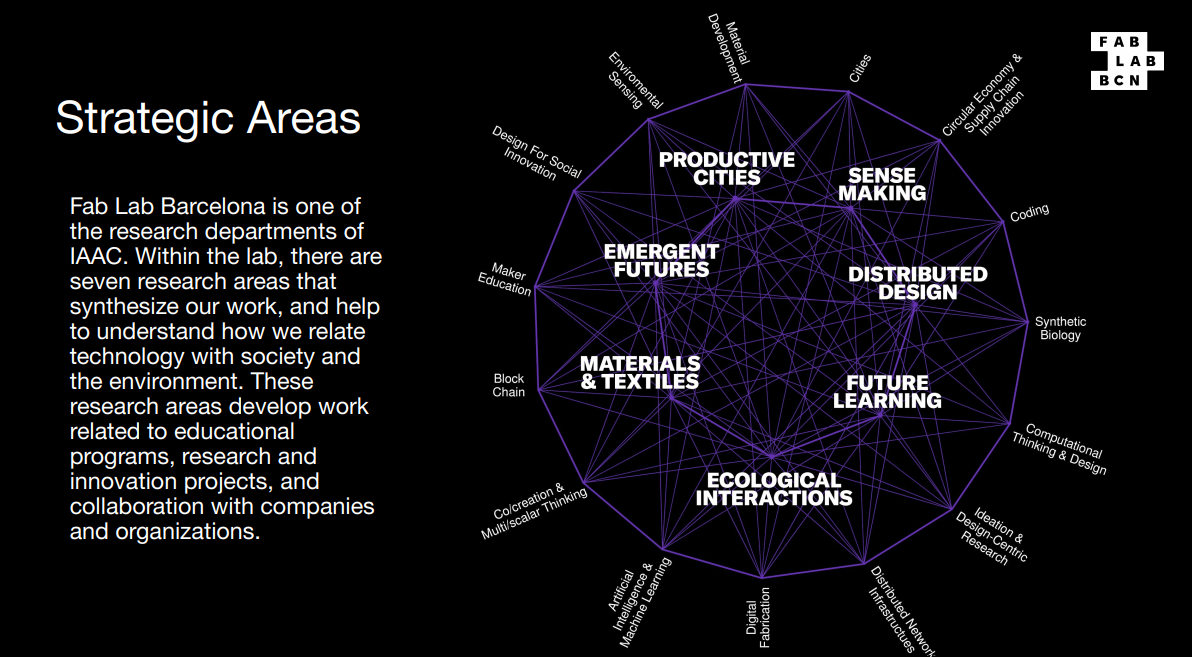
Go Back Term1


Local entities and neighborhood communities play an essential role in the everyday life of their residents. They contribute to social cohesion, provide support and solidarity, promote civic participation, preserve local culture and traditions, drive neighborhood development and improvement, offer education and resources, foster diversity and tolerance, and contribute to the establishment of a strong community identity.
Districte Cultural 22@La Plataforma / Biciclot / Bioma @bioma.cat / Transfolabs @transfolab_bcn
“My” interesting entities, studios, cultural and artistic centers that are part of the Poblenou neighborhood:
Galeries d’art, museus i showrooms: BD / Museu Can Framis / Disseny Hub Barcelona / MaterFab / Ket galeria
Centres de creació i estudis d’artistas: La Escocesa / Hangar / Antoni Arola Studio/ OnionLab / TigreLab /ProtoPixel/ AcidHouse/ FolchStudio /White Horse / Palo Alto /mauricigines/ na.b3collective /BeatMe Lab /
Centres de formació en disseny i arquitectura: BAU / IAAC | Fab Lab Barcelona / L’Idem Barcelona / FX Barcelona Film School / Barcelona School of Creativity / SAE Barcelona
Entitats i Centres de l’ajuntament: Centre Civic Can Felipa/ Casal de Joves Can Ricart / Casal de Jóvenes Xiroc / Ateneu Popular La Flor de Maig
The importance of documentation for creative projects
DOCUMENTATION IS A PATH FOR KNOWLEDGE TRANSFER AND COLLABORATION
Spaces:
Elisava Spaces1. Library: https://www.elisava.net/espacios/biblioteca/
As a member of the Elisava Community, you will be able to borrow documents available at the Enric Bricall Library (Elisava’s Library) and also borrow them from other Catalan university libraries.
all of them specialized in the fields of graphic design, product design, industrial design engineering, architecture and interior design.
Schedule
De lunes a jueves, de 9.00 a 20.00h. Viernes de 9.00 a 19.00h.
Contact
"biblioteca@elisava.net"
Online Catalogue
FREB
materials from this collection cannot be checked out and are not freely accessible. For access, contact the library staff.
https://www.bibliotecaelisava.net/Material Designers Collection Space
2.Graphic Design Workshop
tallergrafic@elisava.net
for printing in Elisava you have to send an email to
https://www.elisava.net/wp-content/uploads/2023/09/guia-taller-grafico.pdf.png)
3.Media Lab
4.Sala Motion Capture (MoCap)
Some notes of Guillem’s Lecture:
From convenience to expression technologies: “A shift in the focus of technologies, transitioning from primarily serving everyday tasks to becoming tools that foster creativity and individual expression.
From Survival to Rebel technologies: It suggests a shift in the purpose or focus of technologies, transitioning from those designed for mere survival or basic needs to technologies that are used in a challenging or subversive manner.
From extractive to regenerative technologies: Change towards technologies that seek to restore and preserve the environment instead of depleting its resources.
FabLab Networking
Topics i found interesting:
Epistemology : is the study of knowledge, and it focuses on understanding how we acquire knowledge, how we justify it, and how we assess its validity. This discipline engages in the analysis and evaluation of various epistemological theories and approaches, such as empiricism, rationalism, and constructivism, with the aim of deepening our understanding of knowledge and how we perceive it.
Symbiocracy: In a general context, it refers to a system of government in which different groups or stakeholders work together in a symbiotic relationship to make decisions and manage common interests. It is often associated with the idea that the different involved parties collaborate rather than compete, seeking mutual and sustainable benefit.
Anti - especismo : advocates for the moral equality of all animal species, regardless of their species. It opposes speciesism, which is discrimination based on species, and advocates that all sentient beings deserve ethical treatment and moral consideration. Speciesism involves giving preferential treatment or moral consideration to humans in comparison to other animal species.
Elysa clorostica
Kropotkin
Biohacking: It refers to the practice of biologically modifying and enhancing the human body by applying principles of engineering and technology. It involves the modification of aspects of human biology with the goal of improving performance, health, longevity, or even acquiring new abilities. Transhumanism.
Moral duty
Darwinism
Julian huxley: He is known for his work in evolutionary synthesis, a school of thought that combines genetics andnatural selection in evolutionary theory. Advocate (defensor) of secular humanism.
His focus on the improvement and evolution of humanity and his advocacy for an ethics based on reason and science have certain similarities with the fundamental principles of transhumanism, which aims to apply science and technology to overcome human limitations and enhance the human condition.
Tomàs Huxley : “Bulldog de Darwin”
Nick Bostrom: He specializes in artificial intelligence, ethics, philosophy of mind, and philosophy of technology. He is widely recognized for his contributions to the discussion on the future of artificial intelligence and superintelligence.
He is an influential figure in the field of philosophy of technology and ethics of artificial intelligence. His work has significantly contributed to the understanding of the ethical and philosophical challenges posed by technological advancement and artificial intelligence.
Social neo darwinisme: The term “social neo-Darwinism” is often used in a critical or derogatory context to describe erroneous or poorly-founded interpretations of Charles Darwin’s evolutionary theories, especially when applied inappropriately to human society or to political and ethical issues. It is sometimes used to refer to the misguided interpretation of natural selection and competition as justifications for human behavior, such as racism, sexism, or economic exploitation.
British eugenic society: Eugenics is the study or belief in the possibility of improving the human race through selective breeding or other forms of genetic manipulation. The British Eugenics Society was established in the early 20th century and aimed to apply the principles of eugenics to social policies and practices.
